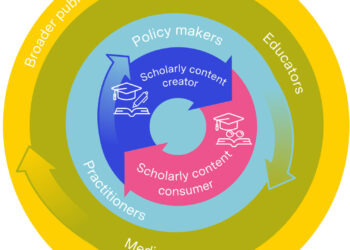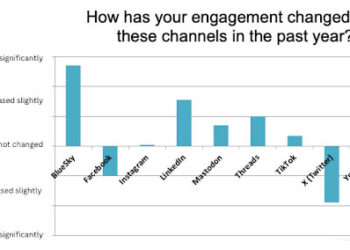
As readers of the Scholarly Kitchen know, for the past several months I have been studying patron-driven acquisitions (PDA). As part of the project, I have been posting sections of the report in informal installments here on the Kitchen. There were a couple reasons for this. One was simply to get information out there when it had been formulated, as I had no real incentive to withhold anything until the entire report was completed. The second reason was that I wanted to use the Kitchen as a research tool, publishing provisional mini-essays in public in order to get feedback. That feedback proved to be valuable for the process of drafting the complete report, and it’s worth thinking about how blogging can be used in this way.
First, a bit of background on the Kitchen itself. The Kitchen is an all-volunteer operation run for the Society for Scholarly Publishing by Kent Anderson and Phil Davis, the editor-in-chief and executive editor, respectively. There are several contributors; not everyone contributes with equal frequency. One reason to have a team of bloggers is that there is something new on the Kitchen every day, which is one of the critical requirements for establishing a blog and getting Web traffic. It’s a lot of work to contribute to a blog, but the amount of work would be overwhelming if you tried to do it by yourself. Each contributor supports one another, even when we strongly disagree with one another (which occurs more frequently than many readers suppose). Judy Luther’s posts bring traffic to the site, which augments the readership for Rick Anderson; Rick’s posts bring readers to Alice Meadows; and so on. A group blog is an effective medium provided that there is some commonality to the writers’ work. I am surprised that there are not more group blogs. Certainly there should be one for academic librarians, though perhaps the liblicense mail group fills this spot. The Huffington Post is the grand model for this kind of publishing.
By posting pieces about PDA on the Kitchen, I was assured that a fair number of people, all involved with scholarly communications in some way, would see the posts and that some of them would be motivated to make comments. For reasons that I do not understand, I continue to receive more comments on my blog posts offline — that is, in private messages to me — than in the online “comments” section that appears at the end of each post. (There is a pattern here. Most online comments are critical and some are nasty. Offline comments are almost always commendatory.) It was an offline comment that informed me that some libraries purchase 100% of their books from Amazon, something I would not have imagined. And it was an online remark that made it clear that some publishers were planning to resist PDA programs by refusing to put their books into them. It would have taken a lot longer to garner that information without the Kitchen. I would have had to interview more people, perhaps many more; and when you put together a work plan for a project of this kind, keeping the number of telephone interviews down is critical, as it is exceedingly difficult to conduct more than three interviews in a day. Blogging is easier and faster, though it is no substitute for a one-hour one-on-one interview.
Using a blog for this kind of research has important limitations. If you have reasons to withhold some information until a report is formally published, a blog will not do — but I had no such constraint. If you are working with anything to do with the marketplace, letting something out on a blog could tip your hand to a competitor. As a practical matter, this means that commercial organizations can’t use blogs in this way because their success is often grounded in knowing things that others do not. Some kinds of information gain value when they are hoarded and not shared, and that includes just about all commercial information. I can’t easily imagine Elsevier or John Wiley blogging openly about their plans for the next three years — or if they did so, it would be in the kind of corporate language that “positions” a company without saying anything worth knowing. “We plan to engage with our customers more closely.” Yeah, right, and I’m going to ride a horse.
The comments would not have come in, however, if the Kitchen did not have an audience. It is that audience that makes the Kitchen a useful research tool, as only a member of the audience will be prompted to comment. To start a project from scratch and to say that there should be a blog for the project gets you nowhere, as the blog will sit on the Web in isolation, unvisited and unremarked upon. A successful blog, in other words, must be an established blog. It has to have a meaningful presence on the Web, a stable of contributors, and an audience that for the most part returns every day. A blog is thus part of a network of communications and it can be activated for a specific project only because it exists outside that project.
This is an argument for everyone to start a blog — right now. A blog is a handy piece of infrastructure, but if you don’t build the bridge beforehand, it won’t be there when you want to cross the river. Blogs of this kind have to be organized around specific topics or “verticals,” as they are known in the trade. I would like to see group blogs on ebooks, academic libraries, and the direct marketing of books. And as for personal interests, group blogs on the Beatles, the Yankees, and Italo Calvino would turn my attention away from the New York Times and the Wall Street Journal. I would also like to see a group blog on copyright, written by lawyers for laymen.
I have found that my reasons for blogging have changed since I first began doing this a few years ago. At first I simply wanted to speak up. I was concerned about an absence of hardheaded business sense in many discussions of scholarly communications and wanted to inject the perspective of the marketplace. Later I found that blogging was a useful marketing tool, bringing inquiries about new projects. (Rule #1: a blog can never be a sales pitch.) But now I see a blog as a community tool, which, if not used inappropriately, brings new resources to investigations. Ultimately the real asset is not the blog but the community that grows up around it.
I am in the process of drafting a proposal for a new research project now and my experience with the Kitchen and the PDA project will figure prominently in that proposal. My access to the Kitchen and its community has become a market differentiator. Thank you.
Discussion
3 Thoughts on "Using the Scholarly Kitchen for Research"
By a wonderful coincidence the Kitchen today posted a research article of mine, designed to do just what you describe, and I am getting a lot of good feedback information that furthers my research. See http://scholarlykitchen.sspnet.org/2012/10/03/the-new-wave-of-gold-oa-journals/. The system works! Mind you I do not think that everyone should start a blog because as you point out it takes a significant critical mass of writers.
In this spirit of inquiry and sharing, Joe, I must ask what your “I am going to ride a horse” line means? That you do not ride or that you do? In either case I was the founding president of Back Country Horsemen in Virginia. See me here: http://www.bchva.org/images/BCHVA_photo_album/photo01.html. If you would like to see what “off-road” travel is like I have a horse for you to ride.
Joe
I always enjoyed reading your posts precisely because you wanted to bring “hardheaded business sense” to discussions that were often untethered in ways that were just not constructive or reality based. Not necessarily destructive but at times even silly. You achieved this without clobbering us over the head with it, but continually making sense of it for those who read the posts. Not everyone with an opinion finds sharing venues furthers their interests and you have clearly shown this is the case if one is willing.I agree that blogs can be a good marketing tool if they are not presented as a sales tool. I too have a strong belief in community and communicating concepts and ideas and making connections. This can be for ideas- for communities- for products. Getting the word out.
Nice to hear that you received feedback with unexpected evidence that will enhance your report.
On the other hand I find I cringe lately when I read about the switch from SEO to content marketing. Every time an article or post or reputable publication reports or supports what they refer to as the blurring of content and advertising, I just feel like some type of media armaggedon is on the horizon and that we live in world with no standards and the rule of law will only apply to commercial enterprise. That is my fantasy of the end of the world via media!
Communities are great for support as well as the fact that folks who care about the same things do have divergent opinions. Too often in recent years we tend to overly segment communities we tend to think of as like-minded and lose much due to such narrow focus. i thought NBC might be on the right track when they decided to stray from the usual demographics but I’m not sure they are headed in the right direction yet either.
Barbara Miller



